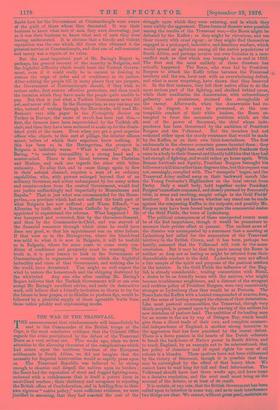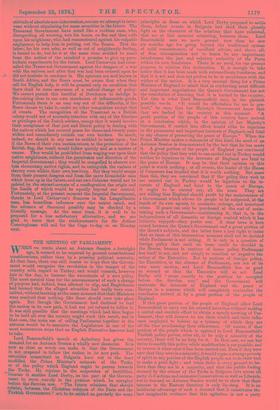1111, WAR IN 'lab TRANSVAAL. struggle upon which they were
entering, and in which they were visibly the aggressors. Three forms of disaster were possible among the results of the Transvaal war,—the Boers might be defeated by the Kaffirs ; or they might be victorious, and use their victory with cruel rigour ; or they might find themselves engaged in a prolonged, indecisive, and desultory warfare, which would spread an agitation among all the native populations of South Africa, and perhaps involve our own Colonies in a race- conflict such as that which was brought to an end in 1853.
The first and the most unlikely of these disasters has actually happened. The Boers, who were led by President Burgers to attack the Kaffir tribes between the Transvaal territory and the sea, have met with an overwhelming defeat,. and what is more surprising, have shown that they deserved it. In the fist instance, they left their native allies to do the more serious part of the fighting, and skulked behind cover,. while their auxiliaries, the Amaswazies, with extraordinary gallantry and persistence, stormed the strongholds of the enemy. Afterwards, when the Amaswazies had re tired, in disgust, it may be presumed, at the con- temptible conduct of their white leaders, the Boers at- tempted to force the mountain positions which are the seat of the power of Secocceni, the chief whose inde• pendence has been threatened by the ambition of President Burgers and the Volksraad. But the invaders had not reckoned either upon the sturdy resistance that would be made by the Kaffirs, or on their own faint-heartedness. The first ambuscade in the obscure mountain passes daunted them ; they- fell back after a slight loss, and with remarkable frankneris they came in a body to their General and bluntly told him that they had had enough of fighting, and would rather go home again. With Roman fortitude and dignity, President Burgers besought his followers to kill him rather than disgrace him, but this request was• not, seemingly, complied with. The" stampede " began, and the Transvaal Army melted away on their backward march like the Young Pretender's Highlanders on the fatal retreat from Derby. Only a small body, held together under President Burgers' immediate command, and closely pursued by Secocemi's tribe, in arms and exulting, sought refuge in the Gold Fields' territory. It is not yet known whether any stand can be made against the conquering Kaffirs in the outposts, and possibly Mr. Burgers may have been forced back upon the commercial centre of the Gold Fields, the town of Lydenburg.
The political consequences of these unexpected events must be of the first importance, though it would be premature to measure their precise effect at present. The earliest news of the disaster was accompanied by a statement that a meeting at Lydenburg had called for the annexation of the Transvaal territory to the British Crown, and it has been, perhaps too hastily, assumed that the Volksraad will rush to the same conclusion. But it may be that the panic among the Boers is neither so deep nor so lasting as might be inferred from their- discreditable conduct in the field. Lydenburg may not afford 'a fair sample of the spirit and purposes of the pastoral settlers in the interior. In the Gold Fields the influence of the Eng- lish is already considerable ; trading connections with Natal, a desire to be on friendly terms with the natives, who might become troublesome neighbours, and a distrust of the arrogant and reckless policy of President Burgers, were very conceivably stronger at Lydenburg than they would be at Pretoria. The Boers hate the Kaffirs with a hatred compounded of avarice, fear, and the sense of having wronged the objects of their detestation. Like most pastoral communities, the Transvaal, though very thinly peopled, is pressed upon by the craving of the settlers for new stretches of pasture-land. The ambition of its leading men for an access to the sea by way of Delagoa Bay, which would give them a direct trade of their own, and complete commer- cial independence of England, is another strong incentive to the aggression that has been punished by the recent defeat. There is a fierce passion in the hearts of the Dutch colonists to break the back-bone of Native power in South Africa, and to teach England, by an example not to be misconstrued, that her policy of clemency and of equal rights for men of all colours is a blunder. These motives have not been obliterated by the victory of Secocceni, though it is possible that they may be outweighed by the effect of that heavy blow. We cannot have to wait long for full and final information. The Volksraad should have met three weeks ago, and have-newt to a decisive resolution, and the next mail must bring us the account of the debate, or at least of its result. It is certain, at any rate, that the British Government has been called upon to interfere in some way, and as to such interference two things are clear. We cannot, without great peril, maintain an attitude of absolute non-intervention, nor can we attempt to inter- vene without stipulating for some securities in the future. The Transvaal Government have acted like a reckless man, who, disregarding all warning, sets his house on fire and then calls upon his neighbour, who had remonstrated against his culpable negligence, to help him in putting out the flames. This the latter, for his own sake, as well as out of neighbourly feeling, is bound to do, but he is at the same time entitled to exact from the author of the mischief a promise to give up pyro- technic experiments for the future. Lord Carnarvon had coun- selled the Transvaal Government against the dangers of a war with the natives, and after that war had been entered upon he did not hesitate to condemn it, His opinions are well known in South Africa, and the Boers must be aware that when they call for English help, it will, be granted only on condition that there shall be some assurance of a radical change of policy. We cannot permit this handful of Dutchmen to indulge in fire-raising close to our own storehouse of inflammable goods. Fortunately there is an easy way out of the difficulty, if the Boers choose to take it, under no other compulsion except that of events. The recognition of the Transvaal as a British colony would not of necessity interfere with any of the liberties or privileges of the Dutch settlers, except that it would involve their acceptance of that just and liberal policy in dealing with the natives which has secured peace for three-and-twenty years within and immediately outside our own borders. So much, indeed, we should in any case be entitled to insist upon ; but if the Boers of their own motionretuim to the protection of the British flag, the result would follow quietly and as a matter of course. They would be prohibited from waging-war upon their native neighbours,witheut the permission and direction of the Imperial Goffermamt ; they would be oompelied to observe cer- tain elementary native rights, and to extinguish the embers of slavery even within. their own territory. Rut they would escape, from their present dangers and from the more formidable ones which leom up in the future, and our own Colonies would not be palsied by the oternalmenace of a conflagration the origin and the limits of which. would be equally beyond our control. Fortunately, at the present moment the Imperial Government, thanks to Lord Carnarvon's firmness in the Langalibalele ease,, has boundless influence over the native mind, and the advance of Secocoani possibly may be checked by a friendly message. At the same time, it, is well to be prepared for a less satisfactory alternative,, and we are glad to learn that the reinforcements for Sir Arthur Cruoningharne will sail for the Cape to-day or on Monday































 Previous page
Previous page